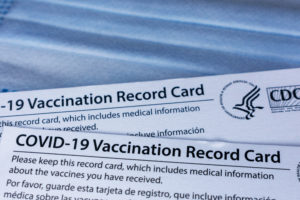 In case you missed it, President Biden made an announcement on July 29, 2021 stating that all federal employees and onsite contractors had to attest to their vaccination status. He also declared that those not fully vaccinated would have to take additional precautions to reduce the risk of them spreading or becoming infected with the coronavirus.
In case you missed it, President Biden made an announcement on July 29, 2021 stating that all federal employees and onsite contractors had to attest to their vaccination status. He also declared that those not fully vaccinated would have to take additional precautions to reduce the risk of them spreading or becoming infected with the coronavirus.
But does he have the legal authority to do that? And aren’t there exceptions to requiring workers to get vaccinated? The short answer to both those questions is yes.
Read on to get a more in-depth examination as to why. And if you have any additional questions, it might be worth getting in touch with a Maryland federal employment lawyer, such as one from the Law Firm of J.W. Stafford.
What’s President Biden’s Legal Authority to Require the Coronavirus Vaccine?
While the legal basis for the President to order the entire country to get a vaccine is unclear, the law is fairly well settled when it comes to federal workers. As the head of the executive branch of government, President Biden has broad authority to decide how the government carries out its duties and obligations. This includes deciding what workforce policies agencies and departments will implement.
Numerous Presidents before Biden have exercised this authority, especially with executive orders. For example, before the U.S. Supreme Court ruled that Title VII of the Civil Rights Act of 1964 (Title VII) protected employees against sexual orientation and gender identity discrimination, President Obama issued an executive order that barred federal contractors from discriminating based on gender identity or sexual orientation.
What Exactly Is President Biden Requiring?
Per his July 29th announcement, President Biden will require all federal workers and onsite contractors to attest to their COVID vaccination status. If a worker cannot confirm that they are fully vaccinated against the coronavirus, they must:
- Wear a mask on the job;
- Socially distance themselves from other workers or customers;
- Get tested for the coronavirus at once or twice a week; and
- Have reduced or eliminated work-related travel.
Federal departments and agencies are still working on how to implement this requirement, but a special Certification of Vaccination Form has been prepared. The worker completing the form will have four options to attest to:
- They are fully vaccinated;
- They are partially vaccinated;
- They are not vaccinated; or
- They refuse to answer.
Unless the individual is fully vaccinated, they will be required to abide by the mask, testing, social distancing and travel requirements. If a federal employee or onsite contractor lies on this firm, they are subject to workplace discipline, including getting fired or losing their eligibility to access classified information (if applicable).
They may also be subject to criminal penalties pursuant to 18 U.S.C. § 1001. Penalties include getting fined and serving up to five years in prison.
Can Federal Employees Ask for a Medical or Religious Accommodation?
Yes, but they may not get the accommodation they want. If the worker has a disability recognized by the Americans with Disabilities Act of 1990 (ADA) that prevents them from getting vaccinated, they may be entitled to a reasonable accommodation that includes not having to get vaccinated. But the reasonable accommodation cannot place an undue burden on the federal government.
If getting vaccinated against the coronavirus is somehow against the worker’s religious beliefs, then Title VII of the Civil Rights Act of 1964 (Title VII) could apply. Here, Title VII could exempt the worker from the vaccination requirement. This exemption must not put an undue hardship on the employer, though.
What constitutes an undue burden or hardship depends on the size and money of the employers. Given the resources of the federal government, courts will place a higher standard on whether a requested accommodation constitutes an undue burden or hardship.
Keep in mind that what President Biden announced on July 29th isn’t technically a vaccination mandate. That’s because it didn’t tell the workers, “get vaccinated, or else.” Instead of getting vaccinated, workers can choose to abide by additional COVID workplace protocols.
The ability to avoid the vaccine and instead be subject to the extra coronavirus workplace precautions can arguably be a reasonable accommodation. But it’s possible that depending on the circumstances concerning the individual’s workplace and job duties, the worker could be entitled to different accommodations, such as working remotely.
Still Unsure of Your Legal Rights as a Federal Employee?
If you’ve still got questions about whether you need to get the COVID vaccine, what might happen if you refuse to get one or how you should answer the Certification of Vaccination Form, don’t hesitate to contact the Law Firm of J.W. Stafford. You can talk to a Maryland federal employment lawyer that can answer your questions and explain your legal options.
